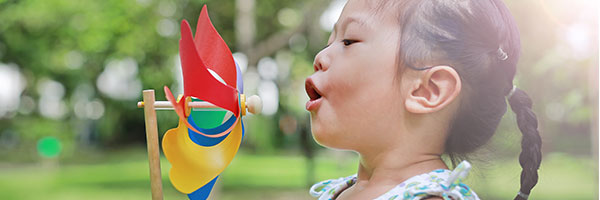
While some changes in breathing are temporary and relatively harmless, other breathing difficulties may be a bigger problem:
Irregular Breathing in Newborns
Newborns will often begin speeding up their breathing for a few seconds and then slow it down, especially when sleeping. This type of irregular breathing is normal and does not require treatment. If irregular breathing persists past 6 months of age, talk to your pediatrician to ensure your child's breathing is healthy.
If your infant displays any of the symptoms listed below, immediately seek emergency care.
If Your Child Stops Breathing
If your child has stopped breathing and is not responsive, immediately begin CPR and call 911.
If your child ceases breathing for 15 seconds or more, and then resumes breathing, visit the pediatric ER. Even if your child seems fine, it is important to make sure the underlying reason for the episode has been resolved.
Many children between the age of 6 months and 6 years experience breath-holding spells, involuntary breath holding that usually occurs when the child is crying or upset. Children who experience these spells do not need to seek emergency care unless the incident results in unconsciousness or a seizure. In these cases, it is best to visit the pediatric ER to make sure there are no other reasons for the seizure or unconsciousness.
Changes in Breathing
Visit the pediatric ER if you notice these symptoms:
- Breathing that is faster than normal
- Breathing harder than usual without exertion
- One side of the chest or abdomen going up while the other goes down
- Bluish hue to the lips or skin
- Persistent barking cough or wheezing
- High-pitched squeaky sound in the upper airway
- Placing weight on the hands in a tripod position while hyperextending the neck
Child Choking
If your child is recovering from a choking episode in which he or she turned blue but returned to normal or you had to perform first aid, visit the pediatric ER to ensure there are no longer-term consequences.
Pneumonia in Children
Even if your child just seems congested, visit your pediatrician if your child has had an upper respiratory condition for more than five days. If you are concerned your child is not getting enough fluids or using the restroom regularly, seek medical attention. Visit the pediatric ER immediately if your child:
- flares the nostrils when breathing
- has retractions: working too hard to breathe, shown in the areas below the ribs, between the ribs, and in the neck sinking in with each attempt to inhale
Our pediatric ER is close to home and able to help with your child's breathing difficulties. The Children's Hospital at TriStar Centennial strives to beat the national average wait time, so you can get quick access to high-quality, pediatric emergency care.
$webqFacilityNumber
Need a Physician?